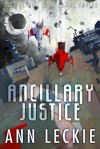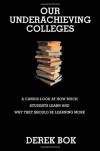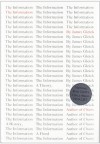Currently reading
McGlue
Knife Fight and Other Struggles
Far from the Tree: Parents, Children, and the Search for Identity
The Good Lord Bird
Ancillary Justice
Our Underachieving Colleges: A Candid Look at How Much Students Learn and Why They Should Be Learning More (New Edition)
Dissident Gardens
Nightmare Movies: Horror on Screen Since the 1960s
The Information: A History, a Theory, a Flood
Complete Novels
 Just under 3/5 of the way through this speaking-of-it-in-fractions-makes-good-sense-sized book, British military officer Edmund Ironside muses that "war was like opera: the plot could be as complex as a spiderweb, but if you could not explain the point in a heartbeat, you were lost." Hmmm. Sunnyside is _______ . . . .
Just under 3/5 of the way through this speaking-of-it-in-fractions-makes-good-sense-sized book, British military officer Edmund Ironside muses that "war was like opera: the plot could be as complex as a spiderweb, but if you could not explain the point in a heartbeat, you were lost." Hmmm. Sunnyside is _______ . . . .A grand, cliffhanger-addled doorstopper of event and Event. Weaving a seamless blur of historical Event and plot-twisting event, Gold follows three primary protagonists (Charlie Chaplin, star and wannabe genius; Leland Wheeler, wannabe star and wayward son; Hugo Black, wannabe aristocrat/elitist and hapless pawn) and what I believe the trades call a cavalcade of big names, scoundrels, doe-eyed naifs, Bolsheviks, soldiers, . . . For the fans of Gold's first novel, the delightful dizzying Carter Beats the Devil, there is a recognizable rush to the read, and rarely a chapter ends without some portentous surprise crisis visited upon and altering the course of the respective chapter's main figure.
But here--and let me finally creep into actual evaluative commentary--is where some disappointment may arise. The forward momentum of Plot is constantly gummed up by a few complications. First, the blur of secondary (tertiary, quaternary) characters can induce vertigo, and I also found myself "ranking" the main three, so seduced by Chaplin that it usually took a few pages (or, in Gold's currency, five or six major events) for me to shift to what seemed (for 3/5 of the novel) like far-less-complicated sidebars. I was picking up on a conscious disruption (second complication), I think -- the novel resists collapse into a genre or a simple pat formula for narrative expectation, as it is in some (explicit yet never heavy-handed) ways an investigation of the role of plots as organizing principles for our philosophies, worldviews, foreign policy. Comedies end with marriage, Chaplin notes, but how do tragedies end? Sunnyside uses plot as endless deferral of that end, keeping us inside the mixed-up uncertainty, unsure what kind of end this will or ought to have. I read somewhere that the author had a 1000-page draft, and whittled it down to this lean 555. Whittle's the wrong verb: reduced, perhaps, like a broth. And it's a thick, dense stew, resistant to those seeking the breezy charm of Carter. You can mistakenly read this novel as if it's a rush of plot, but in so doing at about the 3/5 mark the effort will begin to wear on you, and you'll be (or I was) confused and somewhat confounded by the point.
And Sunnyside has a point. Points. Its effortful juggling of plot, each page so laden with detail and event, can distract from the nuanced and agile dance over BIG historical themes which inform and inflect and enrich the novel. In some ways Gold is chronicling the birth of a modern mediated industrialized global society, where escapism is both bane and boon. His Chaplin is a lovely portrait of artistic production, with all its narcissism and needy insecurity and brilliant grasp of human behavior and untempered joyous disruption of expectations. (If the novel had been pared down even further, to a sleek 250-page study of Chaplin, something significant would indeed have been lost, but the decrease in ambition might also have amplified and refined the perfection of this portrait. I *loved* the stuff on Chaplin. There's an early long chapter solely focused on Charlie at a beach party that was pure, untrammeled delight for this reader.)
Yet point, point--makes the book seem important, meaningful, Significant -- and a chore. It isn't. It's hard work, but so is a pratfall. Page after page Gold's prose works wonders, makes one laugh and blink in delight. Not-so-random example: in the midst of a flurry of activity as Americans land in Russia, Gold in one paragraph conveys the chaos of looting and escape by a band of Bolshevik soldiers:
Cross-gates were open, and men tugged toward the cars mules and horses, wheels of cheese, tungsten blocks, spools of copper wire, and whatever antique carvings of saints weren't nailed down. The train engineer, an Uzbek whose tertiary syphilis made him occasionally a tad grouchy, was tinkering with its wood-burner.
It's not just the detailing--it's that "tertiary syphilis," that "tad grouchy" -- Gold has an enormous gift for creating a world, and a gleeful talent for the pleasures of displaying that world (all that research worn lightly, a bowler cap at the right rakish tilt), and a genuine concern for each and every person imagined (or revealed) in that world. Comedy, tragedy, opera, cliffhanger. Sure. Sunnyside is all those, and more.
I have a feeling if I reread this (and it bears, cries out for, return) I may find even more to love and admire, may be able to sidestep the thirst to know what's next which may have dampened some of my appreciation here. But it is--even with this minor qualification--an enormously satisfying novel.












